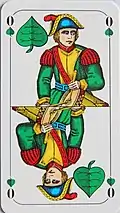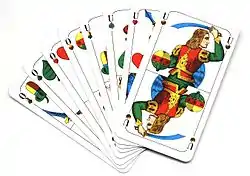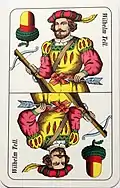Grasobern
Grasobern, Grasoberl, Grasoberln, Graseberla, Grünobern, Lauboberl[2] or Laubobern is a card game that was once commonly played in Old Bavaria, especially in the old counties of Bad Aibling and Rosenheim, and is still popular in eastern Bavaria, especially in Upper Palatinate. The game has relatively simple rules and thus a rather relaxing and leisurely character without the mental demands of Schafkopf or psychological stress of Watten.[1]
| "A game with a rather leisurely character"[1] | |
 The Grasober | |
| Origin | Germany |
|---|---|
| Alternative names | Grasoberln, Graseberla, Grünobern |
| Type | Trick-avoidance, Plain-trick |
| Players | 4 |
| Cards | 32 |
| Deck | German |
| Play | Clockwise |
| Card rank (highest first) | A K O U 10 9 8 7 |
| Playing time | 5 min/hand; 20 min/round |
| Related games | |
| Eichelobern, Schinderhansen, Slobberhannes | |
History
Grasobern originated in "Old Bavaria" – Altbayern[1] - and is recorded in the Bavarian Courier as early as 1826 (as Grünober) being played at home around the table by the "master craftsmen, journeymen and apprentices", along with Solo, Schafkopf, Kreuzmariage, Matzlfangen and others.[3] As Laubobern, the game features in 19th century poetry and literature as a social game.[4][5]
Together with Schafkopf, Watten, and Wallachen, Bohemian Watten and Grasobern were once among the most popular card games in Old Bavaria and therefore an integral part of Bavarian pub culture. Although great fun, these two games are hardly played today and are thus threatened with extinction.[6] As a result, both cultural and traditional costume (Trachten) societies are striving to keep the game alive by holding tournaments.[7][8][9] Even municipalities, such as the market town of Bruckmühl, or smaller local associations, for example the volunteer fire-brigade in the market town of Metten, routinely hold tournaments for Grasobern, Schafkopf and other card games.[10] Some societies are also teaching children how to play the game.[11]
The game is named after the Ober of Leaves or 'Grass Ober', known in German as the Gras-Ober or Grasober.[12]
In Austria, it is usually known as Grünobern, but also goes under the names of Bauernsuchen, Grasobern, Grasoberln, Grasoberspiel, Grünbubenspiel, Grüneln, Grünoberfangen and Grünoberjagen.[13]
No early rules are known, but it is likely that it began as a relatively simple game like Slobberhannes to which the various Bettel and Mord contracts were added more recently.
Players and cards

Grasobern is usually played with four players and a traditional pack of 32 Bavarian-pattern playing cards,[12] although it can theoretically be played with as few as three or as many as eight players.[1] In the trade, card packs are usually marketed under the name Tarock/Schafkopf, from which the Sixes are removed in order to play Grasobern.[12] Each player is dealt the same number (e. g. 40) of counters or coins (Spielmünzen or Blöcke) of the same value (e. g. 5 euro cents); at the end the difference is balanced out by 'buying' (Zukaufen i.e. losses) or 'selling' (Verkaufen i.e. winnings).
If three play, the Sixes and Sevens and Eights are removed and each player receives 8 cards.
In Austria, William Tell packs are always used and the game may be played with 32 or 36 cards.
| Suits of German playing cards | |||
| Bells (Schellen) | Hearts (Herz) | Leaves/Grass (Gras) | Acorns (Eichel) |
Card ranking
There are no trumps in Grasobern. The ranking of card values follows the hierarchy of plain-trick games, such as Watten, i. e. the Ten ranks between the Unter and the Nine. The ranking of cards in each suit is as follows (highest to lowest): Sow (Sau), also called the Ace (Ass) albeit in reality a Deuce (Daus)[14] > King > Ober > Unter > Ten > Nine > Eight > Seven.[12][15]
| Hierarchy of the cards within the four suits | |||
| Acorns | Leaves/Grass | Hearts | Bells |
Aim
Grasobern is a pure plain-trick game. Players do not amass card points (Augen) as in Schafkopf, Doppelkopf or Skat. The aim of the game is to avoid taking the first trick, the last trick and the trick containing the Grasober, the Ober of Leaves. Taking these tricks results in a penalty (Miese), which means that the player who wins them has to pay an agreed fee in coins or counters, such as a Fünferl (five cents) or Zehnerl (10 cents), into the pot or has points deducted.[12]
Contracts other than the normal game have different goals. In Mord and Schleichmord, the aim is to win all the tricks. In Bettel, by contrast, the goal is to lose all the tricks. In these three contracts, the Grasober is not relevant for scoring purposes.[15]
Dealing
Dealing proceeds clockwise and each player is dealt eight cards in two packets of four; thus all the cards are dealt and there is no talon in Grasobern as there is, for example, in the game of Bavarian Tarock.[15] If the player to the right of the dealer knocks with his fist on the deck, instead of cutting, stakes are doubled and each player is dealt one packet of eight cards in clockwise order.
Playing
Bidding
After each player has received eight cards, the player to the left of the dealer, forehand (Vorhand), begins the bidding. There are two other main contracts that may be announced: Mord or Bettel. Mord outranks Bettel, but if two players announce a contract of equal value (e. g. two bid for a Bettel), positional priority governs who becomes the declarer; i.e. player nearest to the dealer's left has priority.[12]
Normal game
If all players 'pass' (i.e. no-one offers to play a Mord or Bettel), a normal game is played in which every player plays for himself. There are no teams. Forehand leads to the first trick and everyone else must follow suit. If a player is unable to follow suit, he must play the Grasober if he holds it. If not, he may play a card of his choice. In addition, the Grasober must be played if the King of Leaves or Sow of Leaves has been led.[12]
Taking the first or last trick costs the player a unit or block, e.g. 5¢, to the pot. Anyone who captures the Grasober in his tricks pays out two blocks to the pot. If a player incurs all the penalties, i. e. takes the first and last trick as well as the Grasober, he is a Farmer (Bauer) and has to pay four blocks to the pot.[12][16] His fellow players stand up with a shout of "Hello!" to draw his attention to the fact that he has to pay a total of four blocks. Payment is made to a common pot, which is divided equally among the players at the end. If a player has wrongly played the Grasober, he pays the two blocks due to the pot and is thus punished for his infringement of the rules.
At the end of the game, or as agreed, the pot is divided among the players.[17]
Other contracts
In addition to the normal game there are three other types of contract:[12]
- Mord
- Bettel
- Schleicher
The Grasobern plays no role in these contracts and the payments for winning or losing are paid directly from the loser(s) to the winner(s); the pot is not involved.
Mord (Rufmord)
If a player believes he is in a position to win all the tricks, he can announce a Mord (which roughly corresponds to the Solo Tout in Schafkopf). The Mord declarer may call for a card from his opponents and exchange it for any card from his hand. To compensate for the benefit of an additional card, the player called to give up the called card has the right to announce and play a Return Bettel (Retour Bettel), also called a Re-Bettel. Otherwise the Mord declarer is allowed to play his announced game. The other three players then form the defending team in a Mord. So unlike a normal game, Mord is not everyone for himself, but one against three. In Mord the declarer leads to the first trick, irrespective of which player is sitting in the forehand position. If the declarer wins, he is paid four blocks by each loser; if he loses, he pays four blocks to each defender. If the declarer opts not to exchange a card, he automatically plays a Herrenmord, in which the stakes are doubled to eight blocks per defender.[12]
Bettel
If a player believes he can avoid taking any tricks, he can announce a Bettel. Unless a Mord or Herrenbettel is announced, the Bettel announcer becomes the declarer and plays a Bettel. As in Mord, the other three players form the defending team, playing against the soloist. The declarer always plays to the first trick in a Bettel. Each player thereafter must attempt to win the trick if at all possible, i.e. Stichzwang applies. Thus a player can even risk announcing a Bettel if he holds a King, because the corresponding Sow has to be played and will beat it. As soon as the soloist takes a trick, the game is lost. If the declarer wins, he is paid three blocks by each of the defenders; if he loses, he pays three blocks to each defender. If the player of the Bettel feels certain of winning, he can announce a so-called Herrenbettel. That means that after the first trick is played, he must play with all his hand cards revealed. The stakes are doubled for Herrenbettel to six blocks per defender.[12]
Schleicher (Schleichmord)
If a player has taken all the tricks from the beginning and is sure that he will win the rest, he may announce a Schleicher ("lurker"). However, he must still hold at least three cards in his hand. If the declarer wins, he collects seven blocks from each of the 3 defenders; if he loses he pays seven blocks to each of them i.e. it costs him 21 blocks.[12]
Austrian variants
Grünobern
The Austrian variant, usually called Grünobern, is played with either 32 or 36 cards from a William Tell pack. It is played in Upper Austria as Grünbubenspiel, Grünoberfangen and Grünoberjagen, as well as in Salzburg and Upper Austria as Grünobern. After each hand, the penalty-earning tricks are turned face up. The pot is divided among the players after a pre-agreed period of time or alternatively saved up for several weeks and used by the players to buy drinks at a so-called 'Grünober Ball'.[13]
Variants:
- All the Obers are worth a penalty point, making at total of seven points per hand.[13]
- Sometimes there is also a rule that forehand (Vordermann) must play a Leaf to the first trick. If he has the Grasober, he must play that.[13]
- The game is played until the pot reaches a certain pre-determined amount of money. Then it is paid out in a reversal of the aim, so that the tricks that were worth penalty points are now worth bonus points.[13]
Grünuntern
Another Austrian variant is Grünuntern in which the Unter of Leaves or Grünuntern simply replaces the function of the Grünober. It is played in Upper Austria, where it is also called Grünunterjagen, Grünbauernfangen or Grünbauernsuchen, in Lower Austria as Grünbauernjagen and in the state of Salzburg as Grünuntern.[13]
Eichelobern

Eichelobern, Schinderhannes or Schinderhansen is a similar game played with a Double German pack in the Austrian states of Salzburg, Tyrol and Upper Austria, where the Ober of Acorns (Eichelober) is the penalty card instead of the Ober of Leaves. However, the game is far less common than "Grünobern", as it is called in Austria.[13] The Ober of Acorns card in a Double German pattern pack depicts the character, William Tell.
References
- Bayerische Kartenspiele: Vom Aussterben bedroht: Retten Sie das Karteln! at www.abendzeitung-muenchen.de. Retrieved 17 August 2018
- Bayerisches Volksblatt, 1858. Retrieved 5 Aug 2019.
- Bayerische Landbote, 1826, p. 606
- "CM's Unglück im Spiele" in Gedichte, Aufsätze und Lieder im Geiste Marc. Sturms by Carl Müller, Regensburg, 1843. Retrieved 1 Dec 2018
- "Wo soll man sparen?" in Skizzenbuch by Carl Theodor Griesinger, Vol. 2, Leipzig, 1844. Retrieved 1 Dec 2018
- Royrmayer 2017, p. 2.
- Alexander Weber siegte beim Grasoberln at www.mittelbayerische.de. Retrieved 23 September 2018.
- Bertin Prasch gewinnt Grasoberln at www.djk-beucherling.de. Retrieved 23 September 2018
- "Grasobern tournaments in Upper Bavaria". Archived from the original on 1 February 2014. Retrieved 17 August 2018.
- "Grasobern events in Bruckmühl". Archived from the original on 1 February 2009. Retrieved 17 August 2018.
- Trachtenerhaltungsverein Moosinning: Kinder lernen Grasobern at www.merkur.de. Retrieved 17 August 2018
- Grasoberln – In der Oberpfalz beliebt at www.br.de. Retrieved 17 August 2018
- Archived 27 August 2018 at the Wayback Machine Geiser, Remigius. "100 Kartenspiele des Landes Salzburg", p. 47.
- Although called the Sau (Sow), modern cards are typically marked with an "A".
- Sirch 2008, pp. 54/54.
- Sirch 2008, p. 75.
- Rohrmayer 2017, p. 75.
Literature
- Hausler, Manfred (2010). Trommler und Pfeifer: Die Geschichte der bayerischen Spielkarten. Munich, Volk. ISBN 978-3-937200-89-7.
- Mala, Matthias (1997). Das grosse Buch der Kartenspiele. Niedernhausen/Ts., Falken. ISBN 3-8068-7333-X.
- Rohrmayer, Erich (2017). Lerne Böhmisch Watten & Grasobern: Eine Spielanleitung für Anfänger. Oberpfalz, Buch + Kunstverlag. ISBN 978-3-9558-7056-0
- Sirch, Walter (2008). Vom Alten zum Zwanzger – Bayerische Kartenspiele for Kinder and Erwachsene – neu entdeckt. Bayerischer Trachtenverband.
